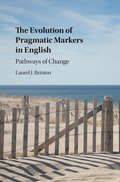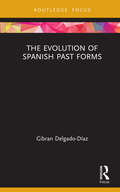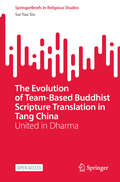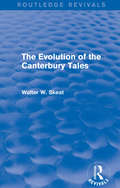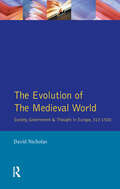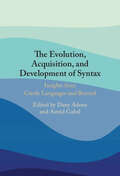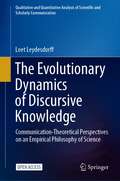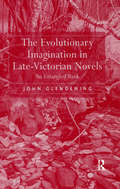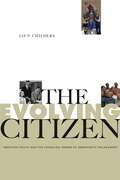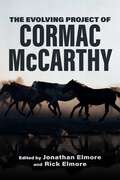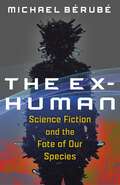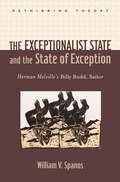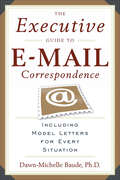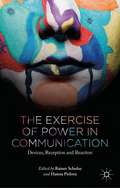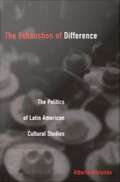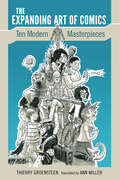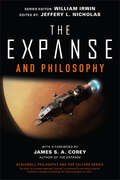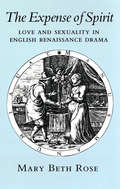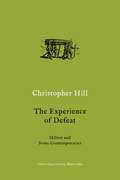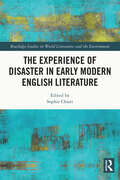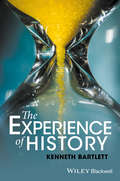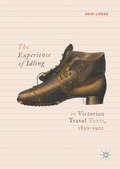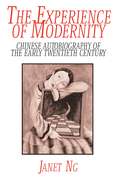- Table View
- List View
The Evolution of Pragmatic Markers in English: Pathways of Change
by Brinton Laurel J.Based on a rich set of historical data, this book traces the development of pragmatic markers in English, from hw't in Old English and whilom in Middle English to whatever and I'm just saying in present-day English. Laurel J. Brinton carefully maps the syntactic origins and development of these forms, and critically examines postulated unilineal pathways, such as from adverb to conjunction to discourse marker, or from main clause to parenthetical. The book sets case studies within a larger examination of the development of pragmatic markers as instances of grammaticalization or pragmaticalization. The characteristics of pragmatic markers - as primarily oral, syntactically optional, sentence-external, grammatically indeterminate elements - are revised in the context of scholarship on pragmatic markers over the last thirty or more years.
The Evolution of Spanish Past Forms (Routledge Studies in Hispanic and Lusophone Linguistics)
by Gibran Delgado-DíazThe Evolution of Spanish Past Forms examines how Spanish past forms have changed diachronically. With examples from Medieval Spanish, Golden Age Spanish, and Modern Spanish literary works, this book demonstrates how language is dynamic and susceptible to change. The past forms considered here include the preterit, the imperfect, the imperfect progressive with estar (temporal to be), the present perfect, the imperfect progressive with other auxiliary verbs, the preterit progressive with estar, and the preterit progressive with other auxiliary verbs. This book will be of interest to scholars and graduate students investigating tense and aspect phenomena in Spanish and other languages, grammaticalization processes, and language variation and change.
The Evolution of Team-Based Buddhist Scripture Translation in Tang China: United in Dharma (SpringerBriefs in Religious Studies)
by Sai Yau SiuOpen Access This open-access book provides a concise analysis of the apex of team-based translation of Buddhist scriptures during the Tang Dynasty, initiated by the notable gathering of translation experts led by Prabhākaramitra. Showcasing the diverse and innovative strategies of translators who joined forces to surmount barriers, this work highlights how their collaborative translation efforts facilitated the spread of Buddhist teachings throughout China. This book brings to light the often overlooked yet crucial roles of these translation teams and examines their organizational structures, translation processes, and the distinct roles of individual members, offering critical insights into the cultural and religious fabric of the period. By enhancing our understanding of the complex dynamics within these institutions, this work also addresses a significant gap in the historical study of sūtra translation in medieval China. It is an essential resource for scholars, students, and enthusiasts of Buddhism, translation studies, and Chinese history.
The Evolution of the Canterbury Tales (Routledge Revivals)
by Walter W. SkeatThe Canterbury Tales by Geoffrey Chaucer, published in 1475, is quite possibly the most famous text written in Middle English and has been studied and analysed countless times over the several hundred years that have passed since original publication. Skeat’s essay, originally published in 1907, aims to explore the organisation of the tales within the whole manuscript. This title will be of interest to students of English Literature
The Evolution of the French Courtesan Novel
by Courtney Sullivan'Sullivan's outstanding book is the first to show how French courtesans were fully-fledged masters of the pen as well as proverbial ladies of the night. We learn how their rewriting of classics such as The Lady of the Camellias and their response to a male "backlash" inspire Colette in previously unseen ways. ' -- Nicholas White, University of Cambridge, UK This book is about the autobiographical fictions of nineteenth-century French courtesans. In response to damaging representations of their kind in Zola and Alexandre Dumas' novels, Céleste de Chabrillan, Valtesse de la Bigne, and Liane de Pougy crafted fictions recounting their triumphs as celebrities of the demi-monde and their outcries against the social injustices that pushed them into prostitution. Although their works enjoyed huge success in the second half of the nineteenth century, male writers penned faux-memoirs mocking courtesan novels, and successfully sowed doubt about their authorship in a backlash against the profitable notoriety the novels earned these courtesans. Colette, who did not write from personal experience but rather out of sympathy for the courtesans with whom she socialized, innovated the genre when she wrote three novels exploring the demi-mondaine's life beyond prostitution and youth.
The Evolution of the Medieval World: Society, Government & Thought in Europe 312-1500
by David M NicholasThis ambitious and wide-ranging study of the European Middle Ages respects the complexity and richness of its subject; always accessible, it is never merely superficial or over-simplistic. Stressing the long-term factors of continuity, evolution and change throughout, David Nicholas discusses the social and economic aspects of medieval civilization, and examines their links with political, institutional and cultural development. Designed for students and non-specialists, his book triumphantly meets the need for a comprehensive survey of the medieval world within the covers of a single authoritative volume.
The Evolution, Acquisition and Development of Syntax: Insights from Creole Languages and Beyond
by Dany Adone Astrid GabelBringing together an interdisciplinary team of scholars, this book explores three interconnected aspects of syntax - its origins and evolution, its acquisition by children, and its role in languages' ongoing development and change. These three distinct areas were linked through Bickerton's most provocative work 'Language Bioprogram Hypothesis' (LBH). This book highlights the discussions on syntax that have emerged over the years as a result of the LBH model. Each chapter include a discussion of Bickerton's work, and a special focus is placed on Creole languages, which provide unique case studies for the study of the evolution, acquisition and development of languages. The book also discusses the relevance of LBH for other natural languages, including sign languages. Shedding light on the relevance of syntax in language, it is essential reading for researchers and students in a wide range of linguistic disciplines.
The Evolutionary Dynamics of Discursive Knowledge: Communication-Theoretical Perspectives on an Empirical Philosophy of Science (Qualitative and Quantitative Analysis of Scientific and Scholarly Communication)
by Loet LeydesdorffThis open access book addresses three themes which have been central to Leydesdorff's research: (1) the dynamics of science, technology, and innovation; (2) the scientometric operationalization of these concept; and (3) the elaboration in terms of a Triple Helix of university-industry-government relations. In this study, I discuss the relations among these themes. Using Luhmann's social-systems theory for modelling meaning processing and Shannon's theory for information processing, I show that synergy can add new options to an innovation system as redundancy. The capacity to develop new options is more important for innovation than past performance. Entertaining a model of possible future states makes a knowledge-based system increasingly anticipatory. The trade-off between the incursion of future states on the historical developments can be measured using the Triple-Helix synergy indicator. This is shown, for example, for the Italian national and regional systems of innovation.
The Evolutionary Imagination in Late-Victorian Novels: An Entangled Bank
by John GlendeningDominated by Darwinism and the numerous guises it assumed, evolutionary theory was a source of opportunities and difficulties for late Victorian novelists. Texts produced by Wells, Hardy, Stoker, and Conrad are exemplary in reflecting and participating in these challenges. Not only do they contend with evolutionary complications, John Glendening argues, but the complexities and entanglements of evolutionary theory, interacting with multiple cultural influences, thoroughly permeate the narrative, descriptive, and thematic fabric of each. All the books Glendening examines, from The Island of Doctor Moreau and Dracula to Heart of Darkness, address the interrelationship between order and chaos revealed and promoted by evolutionary thinking of the period. Glendening's particular focus is on how Darwinism informs novels in relation to a late Victorian culture that encouraged authors to stress, not objective truths illuminated by Darwinism, but rather the contingencies, uncertainties, and confusions generated by it and other forms of evolutionary theory.
The Evolving Citizen: American Youth and the Changing Norms of Democratic Engagement (Rhetoric and Democratic Deliberation #4)
by Jay P. ChildersIt has become a common complaint among academics and community leaders that citizens today are not what they used to be. Nowhere is this decline seen to be more troubling than when the focus is on young Americans. Compared to the youth of past generations, today’s young adults, so the story goes, spend too much time watching television, playing video games, and surfing the Internet. As a result, American democracy is in trouble.The Evolving Citizen challenges this decline thesis and argues instead that democratic engagement has not gotten worse—it has simply changed. Through an analysis of seven high school newspapers from 1965 to 2010, this book shows that young people today, according to what they have to say for themselves, are just as enmeshed in civic and political life as the adolescents who came before them. American youth remain good citizens concerned about their communities and hopeful that they can help make a difference. But as The Evolving Citizen demonstrates, today’s youth understand and perform their roles as citizens differently because the world they live in has changed remarkably over the last half century.
The Evolving Citizen: American Youth and the Changing Norms of Democratic Engagement (Rhetoric and Democratic Deliberation)
by Jay P. ChildersIt has become a common complaint among academics and community leaders that citizens today are not what they used to be. Nowhere is this decline seen to be more troubling than when the focus is on young Americans. Compared to the youth of past generations, today’s young adults, so the story goes, spend too much time watching television, playing video games, and surfing the Internet. As a result, American democracy is in trouble.The Evolving Citizen challenges this decline thesis and argues instead that democratic engagement has not gotten worse—it has simply changed. Through an analysis of seven high school newspapers from 1965 to 2010, this book shows that young people today, according to what they have to say for themselves, are just as enmeshed in civic and political life as the adolescents who came before them. American youth remain good citizens concerned about their communities and hopeful that they can help make a difference. But as The Evolving Citizen demonstrates, today’s youth understand and perform their roles as citizens differently because the world they live in has changed remarkably over the last half century.
The Evolving Project of Cormac McCarthy
by Ahmed Honeini Dr Vernon W. Cisney Jordan Dominy Alex Harmon Dr Trevor Jackson Dr Peter Lurie Dr John Vanderheide Dr Rachel B. Griffis Mgr. Kateřina Kovářová Dr David DeaconThe Evolving Project of Cormac McCarthy presents eleven essays of original scholarship that undertake a programmatic reassessment of McCarthy’s literary and philosophical worldview. Examining issues of race, morality, history, metaphysics, law, economics, and ecology in McCarthy’s writing reveals how these themes intersect in an overarching, positive gesture that characterizes his work. Taken together, the essays offer a more expansive understanding of McCarthy’s critique of contemporary society, while providing new clarity on his vision of alternate ways of living and community beyond their present life-denying manifestations.
The Ex-Human: Science Fiction and the Fate of Our Species
by Michael BérubéFacing threats like climate change and nuclear warfare, science fiction authors have conjured apocalyptic scenarios of human extinction. Can such gloomy fates help us make sense of our contemporary crises? How important is the survival of our species if we wind up battling for an Earth that has become an unhabitable hellscape? What other possible futures do narratives of the end of humanity allow us to imagine?Michael Bérubé explores the surprising insights of classic and contemporary works of SF that depict civilizational collapse and contemplate the fate of Homo sapiens. In a lively, conversational style, he considers novels by writers including Ursula K. Le Guin, Margaret Atwood, Liu Cixin, Philip K. Dick, and Octavia Butler, as well as films that feature hostile artificial intelligence, such as 2001: A Space Odyssey, Blade Runner, and the Terminator and Matrix franchises. Bérubé argues that these works portray a future in which we have become able to see ourselves from the vantage point of something other than the human. Though framed by the possibility of human extinction, they are driven by a vision of the “ex-human”—a desire to imagine that another species is possible. For all science fiction readers worried about the fate of humanity, The Ex-Human is an entertaining yet sobering account of how key novels and films envision the world without us.
The Exceptionalist State and the State of Exception: Herman Melville's Billy Budd, Sailor (Rethinking Theory)
by William V. SpanosCritics predominantly view Herman Melville’s Billy Budd, Sailor as a "testament of acceptance," the work of a man who had become politically conservative in his last years. William V. Spanos disagrees, arguing that the novella was not only a politically radical critique of American exceptionalism but also an eerie preview of the state of exception employed, most recently, by the George W. Bush administration in the post–9/11 War on Terror. While Billy Budd, Sailor is ostensibly about the Napoleonic Wars, Spanos contends that it is at heart a cautionary tale addressed to the American public as the country prepared to extend its westward expansion into the Pacific Ocean by way of establishing a global imperial navy. Through a close, symptomatic reading of Melville’s text, Spanos rescues from critical oblivion the pervasive, dense, and decisive details that disclose the consequences of normalizing the state of exception—namely, the transformation of the criminal into the policeman (Claggart) and of the political human being into the disposable reserve that can be killed with impunity (Billy Budd). What this shows, Spanos demonstrates, is that Melville's uncanny attunement to the dark side of the American exceptionalism myth enabled him to foresee its threat to the very core of democracy in the twentieth and twenty-first centuries. This view, Spanos believes, anticipates the state of exception theory that has emerged in the recent work of Giorgio Agamben, Alain Badiou, Judith Butler, and Jacques Ranciere, among other critical theorists.The Exceptionalist State and the State of Exception illustrates that Melville, in his own time, was aware of the negative consequences of the deeply inscribed exceptionalist American identity and recognized the essential domestic and foreign policy issues that inform the country’s national security program today.
The Executive Guide to E-mail Correspondence: Including Model Letters for Every Situation
by Dawn-Michelle BaudeMake your messages shorter, simpler, and more effective with this guide to writing e-mails that get read—and get results.As we correspond with everyone from international partners to remote workers, writing skills are more important than ever to business and career success. They can make the difference between climbing the corporate ladder and getting stuck on a low rung. An e-mail that’s clear, concise, and targeted will get more than just a response. It will get results—including your boss’s attention.No matter what sector a company is in, excellent written communication skills are in demand—because too-long, wordy, or unclear emails bog down a business. This guide provides insight, guidelines, and a wide variety of templates to help you get it right and rapidly transform basic writing skills into global communications expertise. In a lively, here’s-how style, it:demonstrates the hallmarks of effective business e-mailsfeatures ready-to-use organizational planspresents quick and easy editing techniquesfurnishes before-and-after editing modelsfocuses on the do’s and don’ts of proficient e-mailssupplies practical writing tips and tricks, and more
The Exercise of Power in Communication
by Rainer Schulze Hanna PishwaPower Exercise explores the various choices speakers or communicators make when expressing power relations in modern societies. The volume brings together several disciplines, such as linguistics, sociology, communication studies and social psychology, to give insight into how interactants co-construct different aspects of power in their everyday life. The chapters reveal that the power potential of linguistic elements is dependent on context and is by no means fixed or predetermined, whichprovides implications for research methodology.
The Exhaustion of Difference: The Politics of Latin American Cultural Studies
by Alberto MoreirasThe conditions for thinking about Latin America as a regional unit in transnational academic discourse have shifted over the past decades. In The Exhaustion of Difference Alberto Moreiras ponders the ramifications of this shift and draws on deconstruction, Marxian theory, philosophy, political economy, subaltern studies, literary criticism, and postcolonial studies to interrogate the minimal conditions for an effective critique of knowledge given the recent transformations of the contemporary world. What, asks Moreiras, is the function of critical reason in the present moment? What is regionalistic knowledge in the face of globalization? Can regionalistic knowledge be an effective tool for a critique of contemporary reason? What is the specificity of Latin Americanist reflection and how is it situated to deal with these questions? Through examinations of critical regionalism, restitutional excess, the historical genealogy of Latin American subalternism, testimonio literature, and the cultural politics of magical realism, Moreiras argues that while cultural studies is increasingly institutionalized and in danger of reproducing the dominant ideologies of late capitalism, it is also ripe for giving way to projects of theoretical reformulation. Ultimately, he claims, critical reason must abandon its allegiance to aesthetic-historicist projects and the destructive binaries upon which all cultural theories of modernity have been constructed. The Exhaustion of Difference makes a significant contribution to the rethinking of Latin American cultural studies.
The Expanding Art of Comics: Ten Modern Masterpieces
by Thierry GroensteenIn The Expanding Art of Comics: Ten Modern Masterpieces, prominent scholar Thierry Groensteen offers a distinct perspective on important evolutions in comics since the 1960s through close readings of ten seminal works. He covers over half a century of comics production, sampling a single work from the sixties (Ballad of the Salt Sea by Hugo Pratt), seventies (The Airtight Garage of Jerry Cornelius by Moebius), eighties (Watchmen by Alan Moore and Dave Gibbons), and nineties (Epileptic by David B.). Then this remarkable critic, scholar, and author of The System of Comics and Comics and Narration delves into recent masterpieces, such as Building Stories by Chris Ware.Each of these books created an opening, achieved a breakthrough, offered a new narrative model, or took up an emerging tendency and perfected it. Groensteen recaptures the impact with which these works, each in its own way, broke with what had gone before. He regards comics as an expanding art, not only because groundbreaking works such as these are increasing in number, but also because it is an art that has only gradually become aware of its considerable potential and is unceasingly opening up new expressive terrain.
The Expanse and Philosophy: So Far Out Into the Darkness (The Blackwell Philosophy and Pop Culture Series)
by William IrwinEnter The Expanse to explore questions of the meaning of human life, the concept of justice, and the nature of humanity, featuring a foreword from author James S.A. Corey The Expanse and Philosophy investigates the philosophical universe of the critically acclaimed television show and Hugo Award-winning series of novels. Original essays by a diverse international panel of experts illuminate how essential philosophical concepts relate to the meticulously crafted world of The Expanse, engaging with topics such as transhumanism, belief, culture, environmental ethics, identity, colonialism, diaspora, racism, reality, and rhetoric. Conceiving a near-future solar system colonized by humanity, The Expanse provokes a multitude of moral, ethical, and philosophical queries: Are Martians, Outer Planets inhabitants, and Earthers different races? Is Marco Inaros a terrorist? Can people who look and sound different, like Earthers and Belters, ever peacefully co-exist? Should science be subject to moral rules? Who is sovereign in space? What is the relationship between human progress and aggression? The Expanse and Philosophy helps you answer these questions—and many more. Covers the first six novels in The Expanse series and five seasons of the television adaptation Addresses the philosophical issues that emerge from socio-economics and geopolitics of Earth, Mars, and the Outer Planets Alliance Offers fresh perspectives on the themes, characters, and storylines of The Expanse Explores the connections between The Expanse and thinkers such as Aristotle, Kant, Locke, Hannah Arendt, Wittgenstein, Descartes, and Nietzsche Part of the popular Blackwell Philosophy and Pop Culture series, The Expanse and Philosophy is a must-have companion for avid readers of James S.A. Corey’s novels and devotees of the television series alike.
The Expense of Spirit: Love and Sexuality in English Renaissance Drama
by Mary Beth RoseA public and highly popular literary form, English Renaissance drama affords a uniquely valuable index of the process of cultural transformation. The Expense of Spirit integrates feminist and historicist critical approaches to explore the dynamics of cultural conflict and change during a crucial period in the formation of modern sexual values. Comparing Elizabethan and Jacobean dramatic representations of love and sexuality with those in contemporary moral tracts and religious writings on women, love, and marriage, Mary Beth Rose argues that such literature not only interpreted sexual sensibilities but also contributed to creating and transforming them.
The Experience of Defeat: Milton and Some Contemporaries
by Christopher HillWhat lessons can we learn from the defeat of the seventeenth century English revolution?The failure of the English Revolution in 1660 provoked a variety of responses among radical clergy, intellectuals and writers, as they struggled to accept and account for their defeat in the light of divine providence. Christopher Hill's close analysis of the writings of the Levellers and Diggers, of Fox and other important early Quakers suggests that the revolutionary beliefs and savage social judgments and disillusionments that Milton expressed in his writings at the time were shared by many of his contemporaries. Hill makes a provocative case, as well, that Milton's three great poems--Paradise Lost, Paradise Regained, and Samson Agonistes--came directly out of his painful reassessment of man and his society, and of society's relation to moral order.From the Trade Paperback edition.
The Experience of Disaster in Early Modern English Literature (Routledge Studies in World Literatures and the Environment)
by Sophie ChiariThis book addresses the concept of ‘disaster’ through a variety of literary texts dating back to the early modern period. While Shakespeare’s age, which was an era of colonisation, certainly marked a turning point in men and women’s relations with nature, the present times seem to announce the advent of environmental justice in spite of the massive ecological destructions that have contributed to reshape our planet. Between then and now, a whole history of climatic disasters and of their artistic depictions needs to be traced. The literary representations of eco-catastrophes, in particular, have consistently fashioned the English identity and led to the progress of science and the ‘advancement of learning’. They have also obliged us to adapt, recycle and innovate. How could the destructive process entailed by ecological disasters be represented on the page and thereby transformed into a creative process encouraging meditation, preservation and resilience in the sixteenth and seventeenth centuries? To this question, this book offers nuanced, contextualised and perceptive answers. Divided into three main sections ‘Extreme Conditions’, ‘Tempestuous Skies’, and ‘Biblical Calamities,' it deals with the major environmental issues of our time through the prism of early modern culture and literature.
The Experience of History: An Introduction To History
by Kenneth BartlettThe Experience of History is a lively and passionate introduction to the field that encourages students to seek and appreciate history inside the classroom and beyond. This work: Defines history as a discipline and the role of historians within it Addresses the analytical and critical thinking skills needed to engage with the past Discusses a variety of important topics in the study of history, such as historical evidence, primary documents, divisions of history, forms of historical writing, historiographical traditions, and recent categories of historical research Written by a renowned scholar of European history, this work helps students to become discerning examiners of history and historical evidence in a variety of modern settings like art, architecture, film, television, politics, current events, and more.Learn more about the author and his passion for history in this interview with popular blog Five Books: http://fivebooks.com/interview/ken-bartlett-renaissance-books/.
The Experience of Idling in Victorian Travel Texts, 1850–1901
by Heidi LiedkeThis book brings together theories of spatiality and mobility with a study of travel writing in the Victorian period to suggest that ‘idleness’ is an important but neglected condition of subjectivity in that era. Contrary to familiar stereotypes of ‘the Victorians’ as characterized by speed, work, and mechanized travel, this books asserts a counter-narrative in which certain writers embraced idleness in travel as a radical means to ‘re-subjectification’ and the assertion of a ‘late-Romantic’ sensibility. Attentive to the historical and literary continuities between ‘Romantic’ and ‘Victorian’, the book reconstructs the Victorian discourse on idleness. It draws on an interdisciplinary range of theorists and brings together a fresh selection of accounts viewed through the lens of cultural studies as well as accounts of publication history and author biography. Travel texts from different genres (by writers such as Anna Mary Howitt, Jerome K. Jerome and George Gissing) are brought together as representing the different facets of the spectrum of idleness in the Victorian context.
The Experience of Modernity: Chinese Autobiography of the Early Twentieth Century
by Janet NgAutobiography of the first half of the twentieth century was used variously by different groups of writers to interrogate, negotiate, and even to program the social and political progress of China. However, despite the popularity and success of this genre, it has also been the most forgotten in literary and historical discussions. Personal stories and individual expressions seem to have had no place in 1920s, 1930s, and 1940s China, smothered instead by the grander rhetoric of nationalism. For this reason, autobiography's popularity during the era is an odd phenomenon and also an important genre for study. The May Fourth Era (1917-40) began as a movement to make the classical literary language accessible to the common people and became a broader political movement against imperialism. The writing of autobiography was influenced by the idea of literature's social and political mission, yet at the same time autobiography was a uniquely potent venue for individual expression. Janet Ng examines this notion in The Experience of Modernity within the framework of autobiographical writings by Chen Hengzhe, Lu Xun, Hu Shi, Xie Bingying, Xiao Hong, Eileen Chang, Yu Dafu, and Shen Congwen. Janet Ng is Assistant Professor of Asian Literature, the College of Staten.
